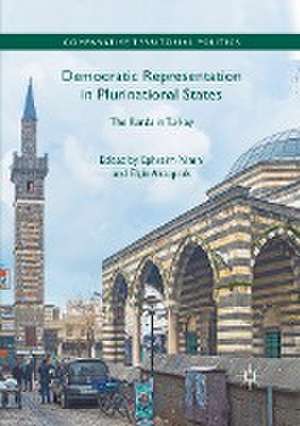Democratic Representation in Plurinational States: The Kurds in Turkey
Editat de Ephraim Nimni, Elçin Aktopraken Limba Engleză Paperback – 18 feb 2020
This book examines modalities for the recognition and political participation of minorities in plurinational states in theory and in practice, with a specific reference to the Republic of Turkey and the resolution of the Kurdish question. Drawing on the experience of Spain and Eastern Europe and other recent novel models for minority accommodation, including the Ottoman experience of minority autonomy (the Millet System), the volume brings together researchers from Turkey and Europe more broadly to develop an ongoing dialogue that analytically examines various models for national minority accommodation. These models promise to protect the state’s integrity and provide governmental mechanisms that satisfy demands for collective representation of national communities in the framework of a plurinational state.
| Toate formatele și edițiile | Preț | Express |
|---|---|---|
| Paperback (1) | 483.92 lei 43-57 zile | |
| Springer International Publishing – 18 feb 2020 | 483.92 lei 43-57 zile | |
| Hardback (1) | 642.51 lei 43-57 zile | |
| Springer International Publishing – 14 ian 2019 | 642.51 lei 43-57 zile |
Preț: 483.92 lei
Nou
Puncte Express: 726
Preț estimativ în valută:
92.60€ • 96.94$ • 76.62£
92.60€ • 96.94$ • 76.62£
Carte tipărită la comandă
Livrare economică 07-21 aprilie
Preluare comenzi: 021 569.72.76
Specificații
ISBN-13: 9783030403614
ISBN-10: 3030403610
Ilustrații: XVI, 255 p. 3 illus., 2 illus. in color.
Dimensiuni: 148 x 210 mm
Greutate: 0.33 kg
Ediția:1st ed. 2018
Editura: Springer International Publishing
Colecția Palgrave Macmillan
Locul publicării:Cham, Switzerland
ISBN-10: 3030403610
Ilustrații: XVI, 255 p. 3 illus., 2 illus. in color.
Dimensiuni: 148 x 210 mm
Greutate: 0.33 kg
Ediția:1st ed. 2018
Editura: Springer International Publishing
Colecția Palgrave Macmillan
Locul publicării:Cham, Switzerland
Cuprins
1. Democratic Nation States and the Antinomies of Minority Representation: The Impact on the Turkish Republic.- 2. Re-Politicizing Non-Territorial Autonomy.- 3. Democratic Autonomy as a Means of Conflict Resolution and Self-Government?.- 4. National Cultural Autonomy in Central and Eastern Europe.- 5. Non-Territorial Autonomy and Western European Diversity Management Regimes: Lessons and Examples for the Turkish Republic.- 6. A Nation-State or a Multinational State? National Conceptions, Minorities and Self-Determination in Spain.- 7. The Kurdish Opening in Turkey: Between Authoritarianism and Peace.- 8. Are Non-Turkish Languages Banned in Turkey?.- 9. Kurdish Movement’s Democratic Autonomy Proposal in Turkey.- 10. Territorial Autonomy and Democratization in Turkey: Prospects and Predicaments.-11. Mapping Rojava: Ideas of Democratic Confederalism and Non-Territorial Autonomy.
Notă biografică
Ephraim Nimni is Visiting Fellow in the Centre for the Study of Ethnic Conflict at Queen's University Belfast, UK. He has published widely on minority rights, models of national self-determination that do not require separate nation states, multiculturalism and the applicability of the national cultural autonomy model to contemporary multination states, and on the Israeli Palestinian conflict.
Elçin Aktoprak was Assistant Professor at the Faculty of Political Sciences, Ankara University, Turkey, until she was dismissed as per the emergency decree in February 2017. Her research interests are theories of nationalism, minority issues in Europe, the Kurdish question, conflict resolution and peace studies.
Elçin Aktoprak was Assistant Professor at the Faculty of Political Sciences, Ankara University, Turkey, until she was dismissed as per the emergency decree in February 2017. Her research interests are theories of nationalism, minority issues in Europe, the Kurdish question, conflict resolution and peace studies.
Textul de pe ultima copertă
This book examines modalities for the recognition and political participation of minorities in plurinational states in theory and in practice, with a specific reference to the Republic of Turkey and the resolution of the Kurdish question. Drawing on the experience of Spain and Eastern Europe and other recent novel models for minority accommodation, including the Ottoman experience of minority autonomy (the Millet System), the volume brings together researchers from Turkey and Europe more broadly to develop an ongoing dialogue that analytically examines various models for national minority accommodation. These models promise to protect the state’s integrity and provide governmental mechanisms that satisfy demands for collective representation of national communities in the framework of a plurinational state.
Ephraim Nimni is Visiting Fellow in the Centre for the Study of Ethnic Conflict at Queen's University Belfast, UK. He has published widely on minority rights,models of national self-determination that do not require separate nation states, multiculturalism and the applicability of the national cultural autonomy model to contemporary multination states, and on the Israeli Palestinian conflict.
Elçin Aktoprak was Assistant Professor at the Faculty of Political Sciences, Ankara University, Turkey, until she was dismissed as per the emergency decree in February 2017. Her research interests are theories of nationalism, minority issues in Europe, the Kurdish question, conflict resolution and peace studies.
Ephraim Nimni is Visiting Fellow in the Centre for the Study of Ethnic Conflict at Queen's University Belfast, UK. He has published widely on minority rights,models of national self-determination that do not require separate nation states, multiculturalism and the applicability of the national cultural autonomy model to contemporary multination states, and on the Israeli Palestinian conflict.
Elçin Aktoprak was Assistant Professor at the Faculty of Political Sciences, Ankara University, Turkey, until she was dismissed as per the emergency decree in February 2017. Her research interests are theories of nationalism, minority issues in Europe, the Kurdish question, conflict resolution and peace studies.
Caracteristici
Questions how to organise post imperial multi-ethnic and multi-nation states so that majorities and minorities can coexist Encourages political participation and collective recognition of minorities so that they do not pursue the road to secession Contributes to the pacification of a democratic and plural Turkish Republic
